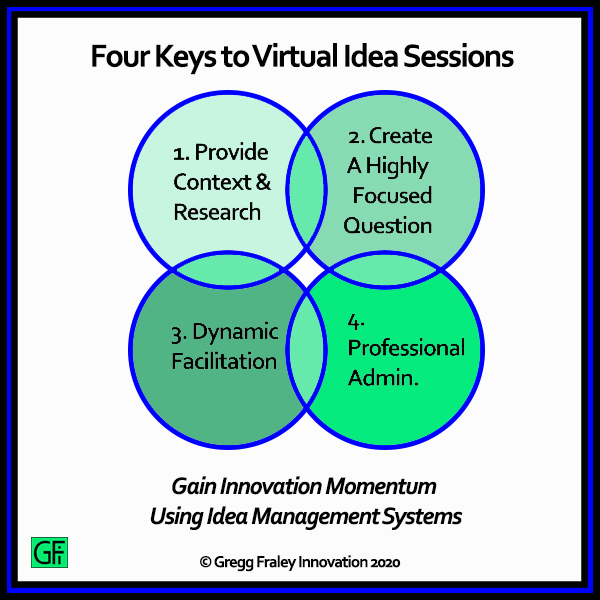Coronavirus Crisis an Ideal Time To Leverage an Underutilized Technology
Idea Management Systems: A Solution for Effective Innovation Remote Work
What if this Coronavirus crisis could be turned into a positive for your innovation program?

Who said “never let a good crisis go to waste?”
With innovation there definitely is an obvious opportunity at hand right now.
An Idea to Help You Maintain Momentum
Do a virtual idea campaign while your people are away from the office.
It is entirely possible to have the best idea generation session you’ve ever had, and done virtually.
A well-executed, carefully facilitated, virtual session, using a modern Idea Management System (IMS) could drive innovation projects for the next year or more.
Wouldn’t this be the perfect time to generate ideas for digital integration? Or supply chain improvements? Or new services?
People are good at generating ideas alone, it’s time to take advantage.
Feature rich and easy to use, virtual systems for idea generation are ready and waiting for this opportunity. The technology is well developed, having been tested, available, and perfected for over 15 years.
IMS products are installed at many big companies, although they tend to be underutilized. Smaller companies are less aware of the technology. It has always struck me as a missed opportunity that more organizations don’t make greater use of them. It could be because they are easy to mis-use (see Keys below).
If you haven’t used one before, this is an ideal time to begin.
There are several vendors that provide inexpensive, short-term, user-based, rentals. Make sure to get one that works on mobile phones and i-Pads. No install, they’re cloud-based.
Do not do a virtual “suggestion box” campaign. That would be a waste of time. It needs to be more focused on problem solving for a specific challenge. What follows are four keys to success.
Four Keys to A Successful Virtual Idea Generation Session:
- Focus: Have a highly focused challenge question (“How Might We…integrate IOT? How might we… reinvent our service offerings?”). This focused question is the most essential key. You want ideas for very specific challenges, otherwise it can devolve into an online gripe session.
- Research & Context First: Provide background information and research to participants before getting started. Or, assign research before starting the idea sprint.
- Actively Facilitate: Make sure the virtual session is actively facilitated on a day to day basis (or you’ll not get maximum participation). Make it fun, keep providing guidance and stimuli for thinking. Get Management to show support for the effort.
- Get Help: If you don’t have the skill to manage this in-house, hire someone who has done it before. They are easy to use, but, they require set-up and that takes training. Contact GFi!
Case study
A client of GFi, an independent concert production company, did a highly successful virtual idea generation. Because of a shift in their industry, they were looking for new revenue ideas. Most of their staff works in remote cities, away from their headquarters. Flying them all in was impractical.
GFI worked with the client lead to define a focused challenge question. Then we communicated with the remote team of about 40 people via a conference call, and kicked off a two-week virtual ideation. By the way, the group could be much larger than 40, IBM has done sessions like this with thousands of people involved. We used a prominent software vendor in the Idea Management space. The session started with distributing some fresh research around their challenge that the client lead had developed.
Day to day, the client lead and GFI reviewed the ideas and further focusing and encouraging the team. We had fun with it, providing incentives and prizes, and attainable-but-stretchy goals. As ideas emerged people really got excited and the ideas got better and better.
Two weeks later we had 400 quality ideas in the IMS database. We also had a sense of what the team had energy for, as we used commenting, voting, and ranking features of the software. We organized a live convergence session at HQ and we selected a subset of ideas for further development. This was done with a small group and the ideas improved as they were discussed and developed into more fleshed-out solutions.
The best five idea/solutions were pitched to management and one was selected to take to market. One was scheduled for the next year.
The end result, six months later, was a highly profitable craft beer festival, incorporating local musicians. It was a smashing success. This became a yearly event, and, they replicated the festival idea across several regions. It’s now one of their key revenue streams.


